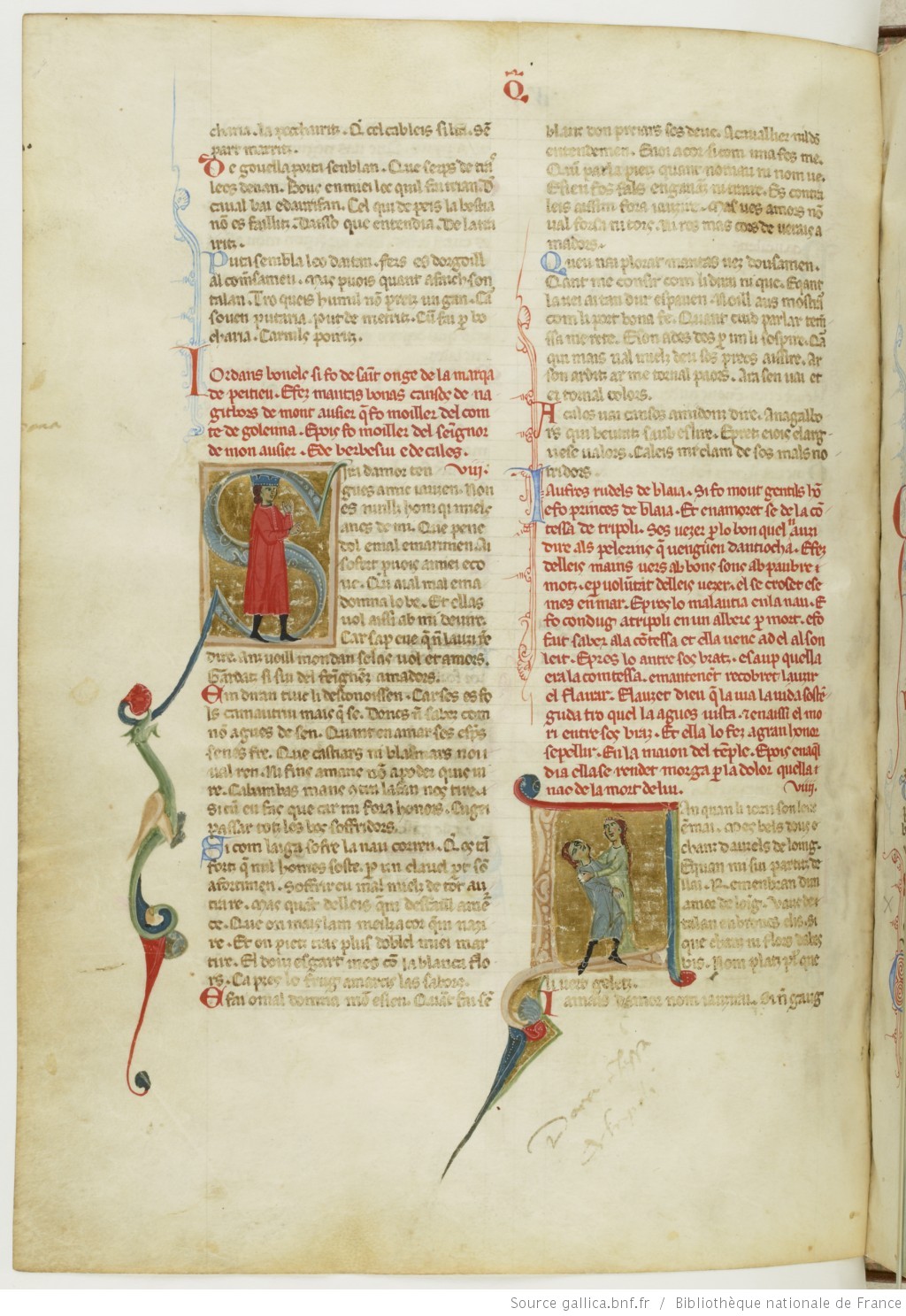For our TEI digital humanities project, we chose to interpret and encode a poem by
troubadour Jaufré Rudel. The poem features the first exploration in troubadour canon of
'amor de lonh.' This poem gives the story of what would become a traditional motif of
troubadour poetry: love from afar. Jaufré Rudel, the twelfth-century poet, wrote this
poem about the love he held for the Countess Hodierna of Tripoli, a woman whose beauty
was sung across continents. Although he had never seen her, he writes of his unmatched
love for her with the superlatives popular among the medieval poets.
The vida biography before the poem tells the story of their first – and
last - meeting. When Rudel was finally able to visit the Countess, he becomes ill on the
trip to Tripoli (Lebanon). Hodierna had heard of his coming and met him at a hospice
when he reached the shore. The poet died in her arms, and the embrace is memorialized in
the manuscript illumination. This poem creates the literary trope of the “distant
princess” who is known not for her political prowess but for her simple attractiveness
and shows the power of the troubadours’ true love – amor de lonh.


![]() Lan quan il jorn son long en
mai
M'es belg douse chanz d'auzels de loing
E quan mi sui partiz de llai
Remenbran d'un amor de loing
Vauc de talan enbroncs clis 5
Si que chanz ni flors d'abes bis
Nom platz plus que li vert geletz
Lan quan il jorn son long en
mai
M'es belg douse chanz d'auzels de loing
E quan mi sui partiz de llai
Remenbran d'un amor de loing
Vauc de talan enbroncs clis 5
Si que chanz ni flors d'abes bis
Nom platz plus que li vert geletz
Ja mais d'amor n'om jauzirai
Si n'om gaug  d'est amor
loing
Que gensor ni meillor n'on
sai
Ves nuilla part ni pres ni loing
Tant es sos pretz verais fis 5
E que lai el rene del Sarrazis
Fos eu per leis caitius clamatz
d'est amor
loing
Que gensor ni meillor n'on
sai
Ves nuilla part ni pres ni loing
Tant es sos pretz verais fis 5
E que lai el rene del Sarrazis
Fos eu per leis caitius clamatz
Jratz iausens m'en partrai
Qan verai c'est amor de loing
Que per un ben que m'en eschai
N'ai dos mals si ben sui de loing
Acon fora o dreichs pellerins 5
Si iamos focs ni mosta pis
Fos per fos bels oills remiratz
Dieus que fes tot quant es
efai
E formet no str'amor de loing
Bidon poder qun qui a lai
Fu remir c'est amor de loing
Veraiamen en tal aisis 5
Si que la canbra el iardis
Mi senblonmai sos e palatz
Ben para jois quant li querrai
Per amor Dieu l'alberc de loing
E s'a lei platz albergarai
pres de llei si bem sui de loing
Adoncs paral parla mens fis 5
Quan drutz londans er tan vezis
ab bels ditz jausira solatz
Jaufré Rudel
Translation
While the days are long in May, it makes me happy to hear the song of faraway birds, and
when I am there, it makes me remember a love from afar: I go, then, pensive, sad, and
with a lowered head; and neither songs nor hawthorn flowers make me happy while the
winter freezes over.
I hold, certainly, for true, the gentleman who will let me see this faraway lover; but
for every good that comes my way, two evils befall me, all for this love that is so far!
Alas! That I might not pilgrim there, before my lance and my slave are seen by her
beautiful eyes.
What joy will appear to me, when I will ask him, the distant host, for the love of God,
to accommodate me: and, if it pleases him, I will be put up close to her, for far away I
am now. What charming meetings will pass, when the lover from afar will be so close to
her that he will be able to gain pleasure from her sweet words.
Sadly and joyfully, I will leave her, if ever I see her, this princess from afar; but I
do not know when I will see her, for our countries are so far from each other; there are
so many passages and ways that I dare not predict. It will pass as it pleases God!
Never will I have such pleasure of love if I am not with this faraway lover; for I do
not know of any woman who is gentler or better, either near or far; her merit is so true
and so great that I would like to be her captive in the country of the Sarrasins
[medieval European name for Muslims].
That God, who creates all that will come and has come, and will form this love from
afar, gives me the power – for I do not have the courage – to go to see this distant
love, in person and in her demureness, such that the room and the garden are now in my
eyes a palace.
He who calls me avid and desirous of a faraway lover is correct; for no other joy
pleases me than to enjoy my distant lover. But there is an obstacle to my desires.
Wretched, therefore, is the godfather who vowed that I would never be loved!